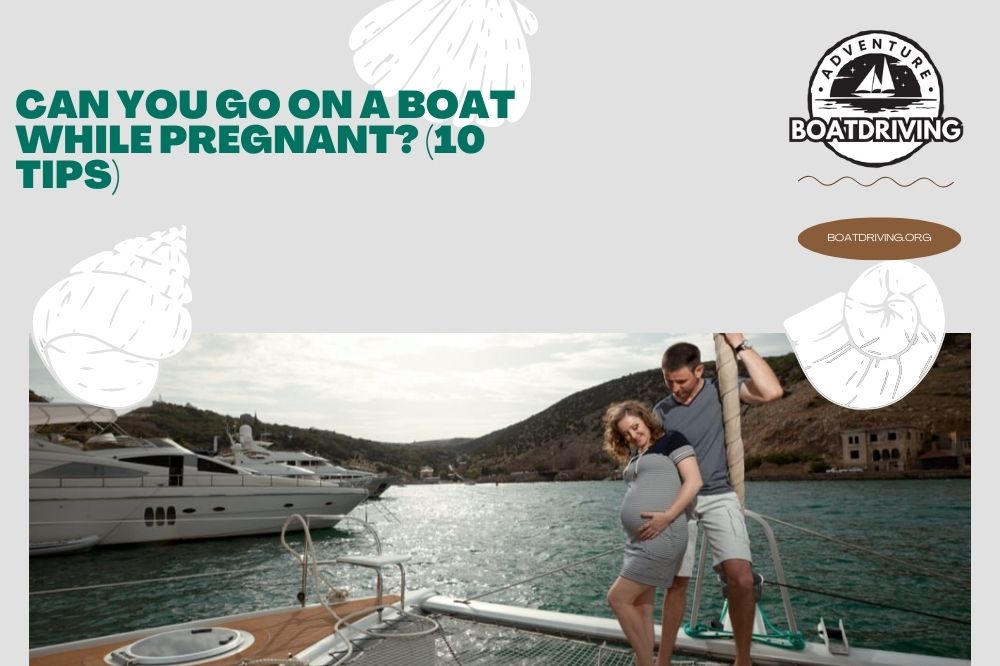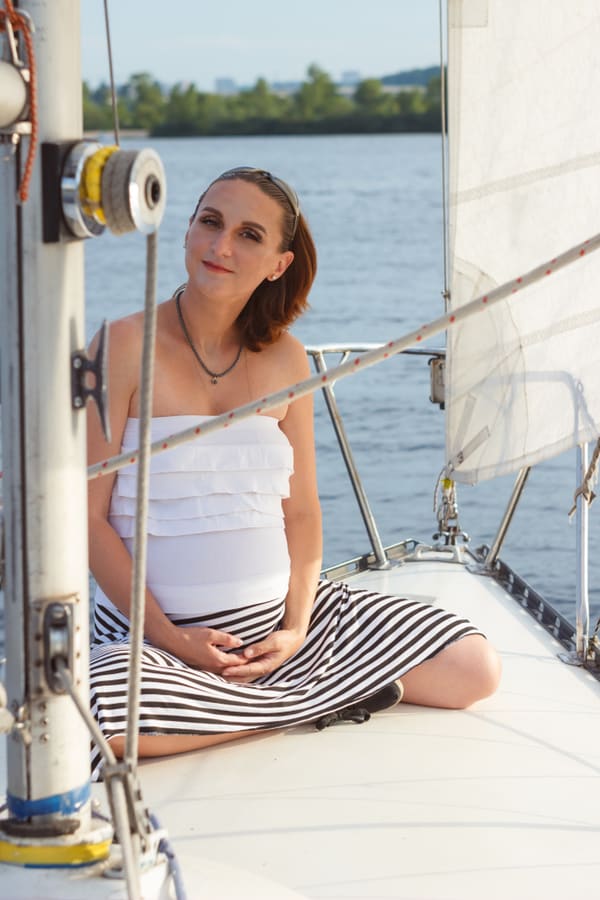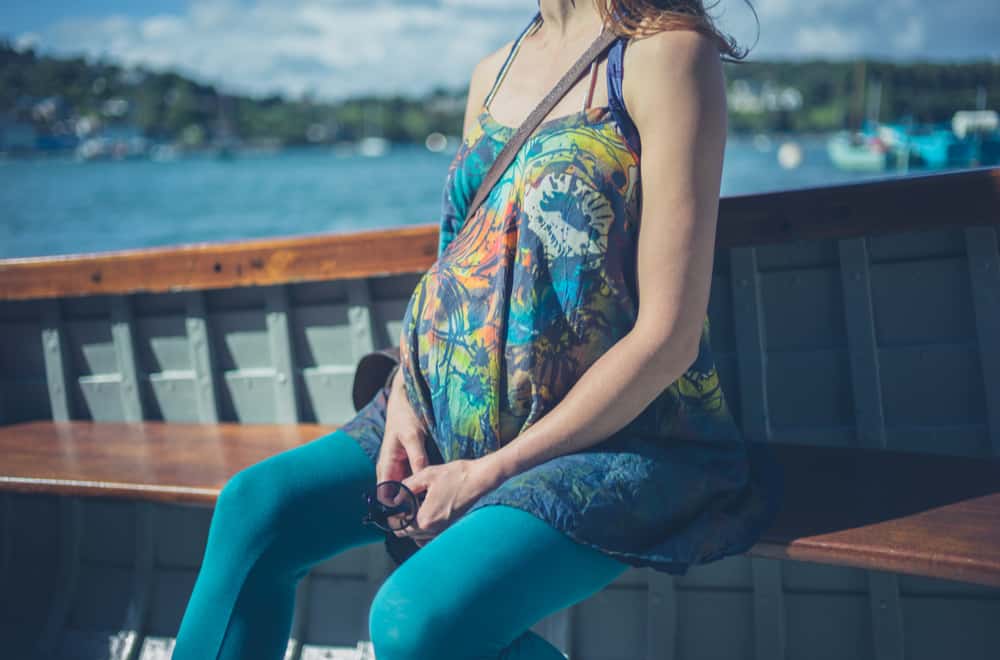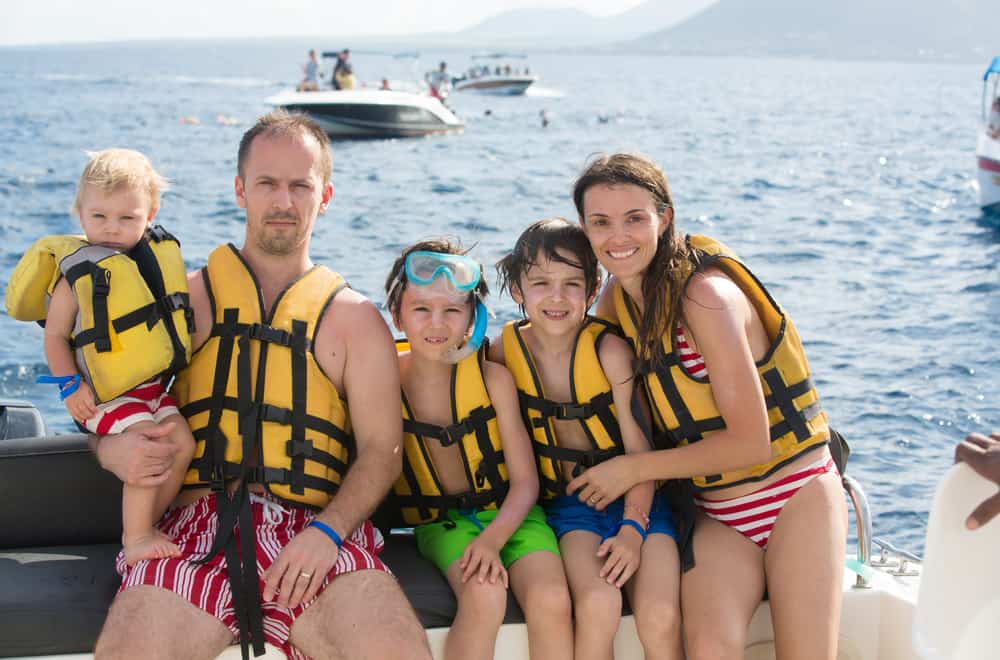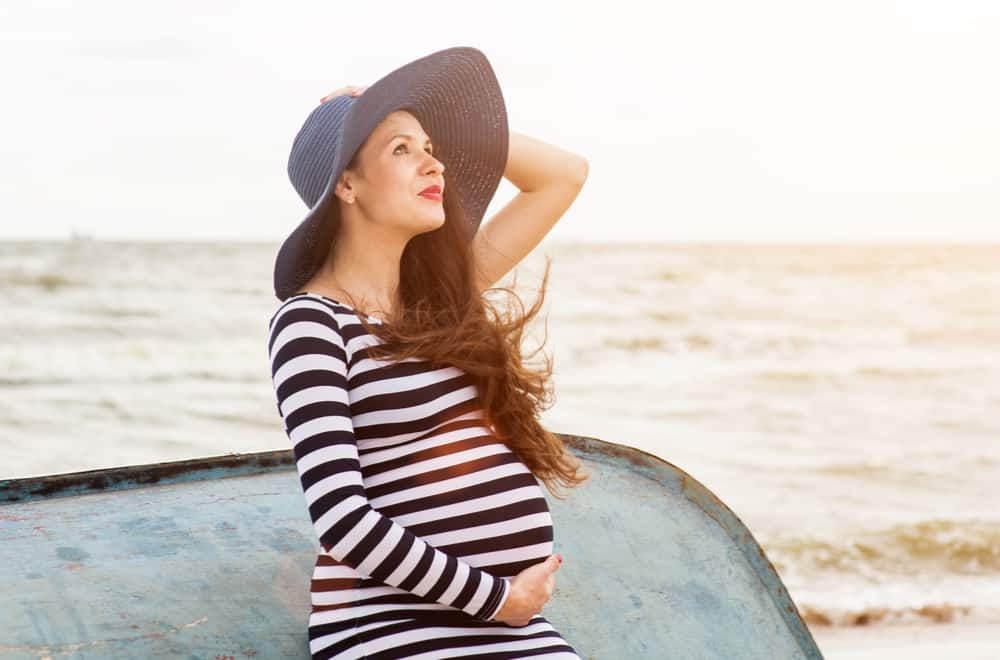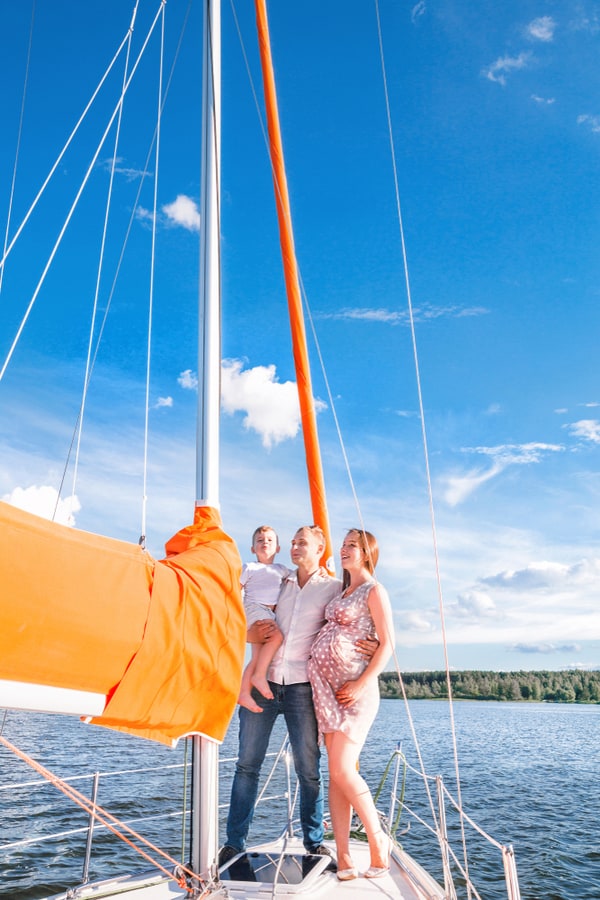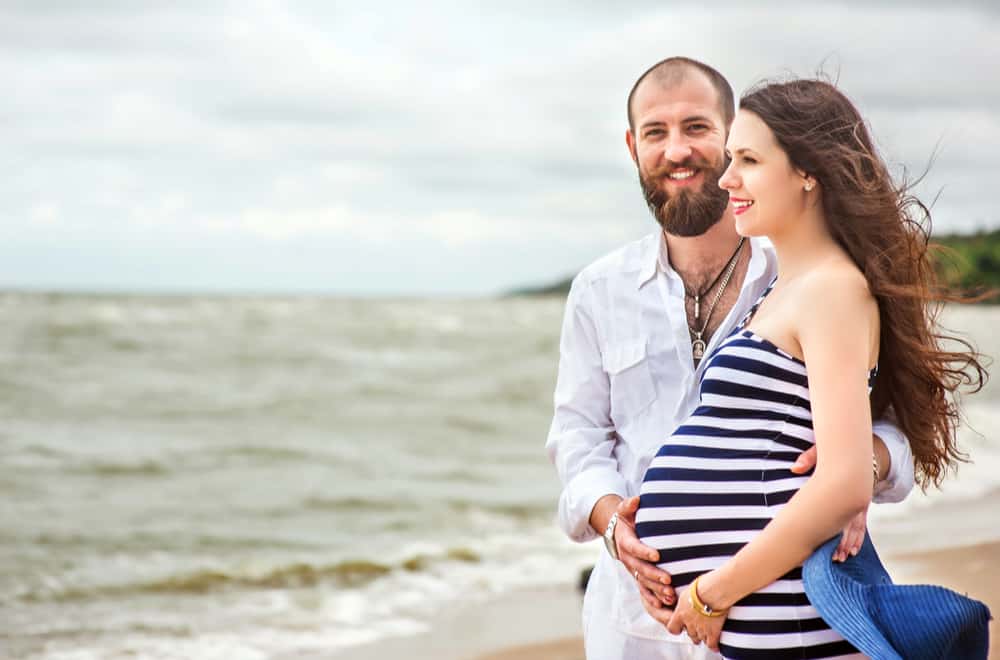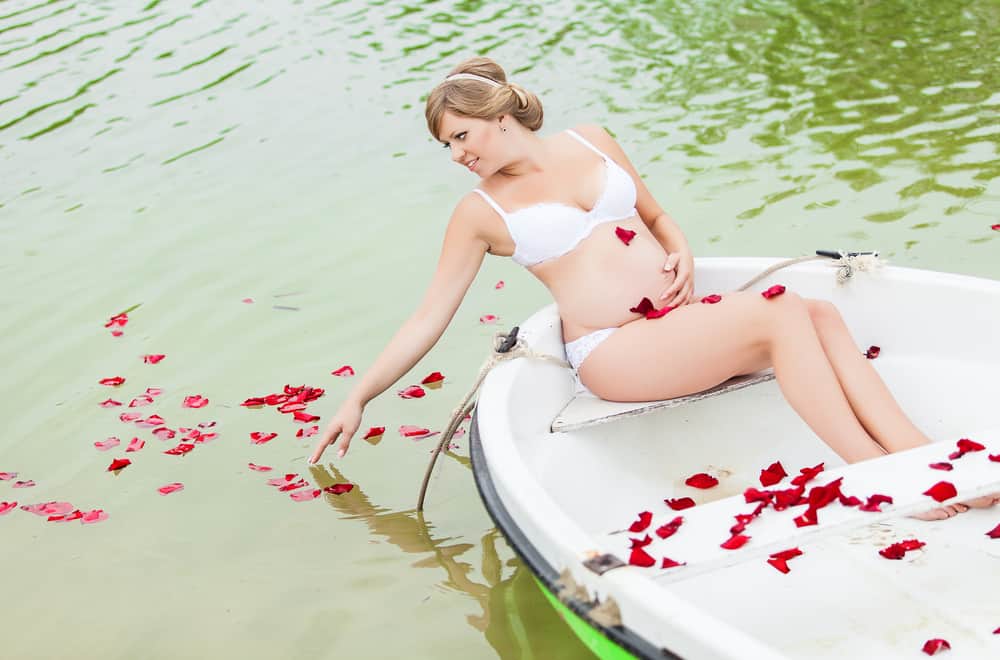Pregnancy can sometimes seem like a long list of things you shouldn’t do and food you shouldn’t eat. So what about spending time on the water? Is that yet another no-no?
That’s what we’re going to explore. We’ll look at the different factors that can influence your safety and that of your unborn child. We’ll investigate how to handle them. And we’ll answer the all-important question of “Can you go on a boat while pregnant?”
Can You Go on a Boat While Pregnant?
Quick Answer: Yes
One important thing to bear in mind before we start is the simple truth that everyone is different. That, of course, extends to pregnant women too.
If there are factors which mean your pregnancy is higher risk, check with your doctor before embarking on any activity. What might be fine for one woman, may not be for another. If in doubt, err on the side of caution and check.
With that caveat out of the way, let’s look at the factors to consider when boating as a mother-to-be.
Tips for boating while pregnant
1. Avoiding Nausea and Sickness
Pregnancy affects every woman differently. But the first and third trimesters will usually be the times when you’re more likely to feel sick and dizzy.
If you’re already feeling sick when you get on a boat, the movement on the water is unlikely to help! And even if you feel okay when you board, a sudden bout of nausea can spoil your enjoyment of your trip.
With that in mind, the second trimester is usually the best time for boating. By then, your morning sickness is likely to have passed. Sticking to calmer waters will also reduce the chance of feeling nauseous.
Having some snacks with you can help key morning sickness at bay for some women. Fresh fruit, crackers and hummus are good options. And they’re easily portable too.
It’s also worth taking into account the size of the vessel. You’re likely to feel much more movement on a smaller craft than on larger boats. A bigger commercial boat on a placid body of water will be the best bet to avoid sickness and dizziness.
And check the weather forecast too! Windy days with big waves mean more movement on the boat. Even a larger vessel won’t be a comfortable ride through white horses.
2. Staying Safe Onboard
Your growing baby bump will affect your sense of balance. That can present particular risks on a boat, where a sudden tip or yaw could result in a fall.
If you’ve been experiencing problems with dizziness, it’s best to wait until they’ve passed to go boating. For most women, those problems will be most acute in the first and third trimesters. So this is another good reason for aiming to go boating in the second trimester.
If you do head out on a boat, make it a trip that’s on calmer water. The less up-and-down and side-to-side movement you experience, the less the likelihood of it exacerbating dizziness.(2)
For the same reason, stay seated while you’re on the water. And if you do feel dizzy, lie down flat on the deck until the sensation passes. That removes any risk of falling and hurting yourself or your baby.
All this means, of course, that while regular boating is fine, sailing as a member of the crew sadly isn’t. The combination of strenuous exercise and the risk of losing your balance means that this is one activity that’s best avoided.
3. Maintaining Your Core Body Temperature
When you’re pregnant, it can be less easy for your body to cool itself efficiently. That doesn’t mean that boating needs to be off the agenda. But it’s a good idea to consider how you’ll keep cool before you leave the dock.
Does the boat have a bimini or top that provides shade? You’ll find it much more comfortable if it does. If it doesn’t, you could consider taking a parasol to help you stay cool. A hat with a wide brim is a good idea too.
Avoid going out on the water during the hottest part of the day. The sun will be directly overhead at midday, and it will continue to get warmer during the afternoon. In the summer months, you’ll find it more comfortable to head out on your boat during the morning or early evening.
And whatever time of day you go, take plenty of water and drink it regularly to keep hydrated.(3)
Swimming can be a great way to cool off. And the water will also take the weight of your bump, which can be very relaxing. Just make sure that you’re able to get on and off the boat safely and easily.
4. Preparing for Emergencies
It’s always sensible to be prepared for emergencies.
When you’re out on the water, that means ensuring you’re wearing a lifejacket. Conditions can change quickly, and buoyancy aids are essential for everyone. Even a strong swimmer can struggle if taken by surprise or injured when they enter the water.
If you’re pregnant, your bump will add an extra dimension to proceedings! Lifejackets that are too loose are no good. But it’s also important to avoid pressure on your bump.
If you’re going on a cruise with a commercial company, let them know in advance that you’ll need an appropriate life jacket. And if you’re going out on the water under your own steam, invest in one yourself.
Annoyingly, no-one has yet made a maternity life jacket. But one that’s a couple of sizes bigger than you’d usually wear is a good bet. Options designed specifically for women may also give you a better fit. And a life jacket with a strap that goes between your legs will prevent it from riding up.
Bring a first aid kit with you too. You’re unlikely to need it, but it’s always best to be prepared. And make sure that there’s a way of getting in contact with help if necessary, either via radio or cellphone.
5. Consider the Time Needed to Reach a Hospital
As you near the end of your pregnancy, your doctor may advise you to stay within reach of a hospital. The details may vary according to your specific circumstances. But it’s often suggested to stay within an hour of your home from 36 weeks into your pregnancy.
Depending on where you live, that could seriously restrict your boating options. But trips near to shore could still be an option.
If they’re not, don’t despair! You only have four weeks to go. And when you’re ready to hit the water again, you’ll enjoy it all the more.
6. Avoiding Impact
One of the things many women are anxious about during pregnancy is what happens if their bump gets knocked.
The odd contact is largely inevitable in day-to-day life – especially if you already have an active toddler at home! Your uterus is a muscular organ and it’s designed to protect your baby. Light knocks are very unlikely to cause any harm.
Stronger impacts, however, are a different matter. That means high speed boating and large waves should be avoided. They can lead to repeated shocks as your body is raised and lowered.
A gentle cruise on placid water, however, is fine. And it can be a great way to relax, which is good news for you and your baby.
If you’re out on the water and the weather changes, don’t panic. For most women, even a bumpy ride won’t cause serious problems. The amniotic sac and your muscles will provide plenty of protection.
But if you’ve found yourself in that situation and are concerned, call your doctor. Don’t worry about disturbing them – that’s what they’re there for!
7. Avoiding Sunburn
Okay, this has nothing to do with pregnancy! But it’s very easy to forget how important it is to keep your skin protected when you’re out on the water. You can burn even on a cloudy day. And sunlight reflecting on the water can increase the risk.
Sunburn is not only painful, it can lead to serious harm in the form of melanoma – skin cancer, as it’s otherwise known. So make sure you apply sunscreen before you get onto the boat. And keep topping it up whilst you’re out.
If you have very fair skin, it’s a good idea to cover up. That can be a lot less annoying than having to reapply sunscreen every five minutes. And a hat with a wide brim will help protect your face – and avoid the dreaded bright red nose!
If you’re a first-time parent, think of all these precautions as good practice for when your little one comes along. Infant skin is particularly vulnerable to sun damage, and it can result in the development of melanoma later in life. Get into good habits with that sunscreen now.
8. Getting the Most from Boating
The key thing to remember here is that boating is supposed to be fun! Yes, pregnancy means a little more planning and a few extra precautions are needed. But that shouldn’t get in the way of you enjoying yourself on the water.
If you can, enlist some help to check on things like lifejackets. And don’t put yourself under pressure to do more than you feel comfortable with.
If you’re normally the onboard chef, now’s the time to hand those duties to someone else. And if there are no takers, plan to eat out instead.
Go with arrangements that make you relaxed and happy. If you want to share downtime with friends, great. If you’d rather a quieter trip with just your significant other, then do that.
And if you’re finding your usual routine on the boat too tiring, take a rest. Listen to your body, and you won’t go far wrong.
In short, be kind to yourself.
9. What About Other Watersports?
As we’ve seen, boating while pregnant is fine if you take a few precautions and stick to calm waters. But what about other watersports?
The same set of considerations apply. Sports that require great balance or risk falls and heavy impacts on the water aren’t a good idea. That rules out waterskiing, jetskiing, wakesurfing and wakeboarding.
Jetskiing also involves vibration in the pelvic area, which has been linked to premature labor.
But there are alternatives that can be safely enjoyed, particularly in the second trimester. That’s when there’s the least risk of morning sickness or dizziness interfering with your fun.
Kayaking on smooth water can be very relaxing. And swimming is a great form of exercise, making it beneficial throughout pregnancy. Even sailing can be okay, as long as someone else is doing the crewing!
10. Going on a Cruise
When it comes to longer periods on the water, the stage of your pregnancy is key.
Commercial cruise operators will have their own restrictions about when they will carry pregnant women. Most will not accept passengers in their third trimester. And some stipulate that they will not carry women from 24 weeks into their pregnancy onwards.
But regardless of the rules, the key consideration here is your own comfort and security.
Long periods on the water are no fun if you’re suffering with morning sickness or dizziness. As we’ve seen, that’s most likely to be an issue in the first and third trimesters. So it’s best to steer clear of cruises during those stages of your pregnancy.
And you’ll want to be within easy reach of medical facilities as you near the end of your pregnancy. That too will rule out long distance cruising in the third trimester.
Pregnancy Doesn’t Mean You Can’t Enjoy Yourself!
That brings us to the end of our look at the dos and don’ts of safely enjoying the water during pregnancy. Boating is a fun and relaxing activity, and you shouldn’t feel it’s out of bounds whilst you’re expecting.
Just remember that your body will be different. You may be more liable to feeling sick and dizzy, and your balance will be affected. So choose a larger vessel and calmer water. Stay seated during your trip. And keep cool and hydrated, and have some snacks on hand.
Most important of all, relax and enjoy yourself!
